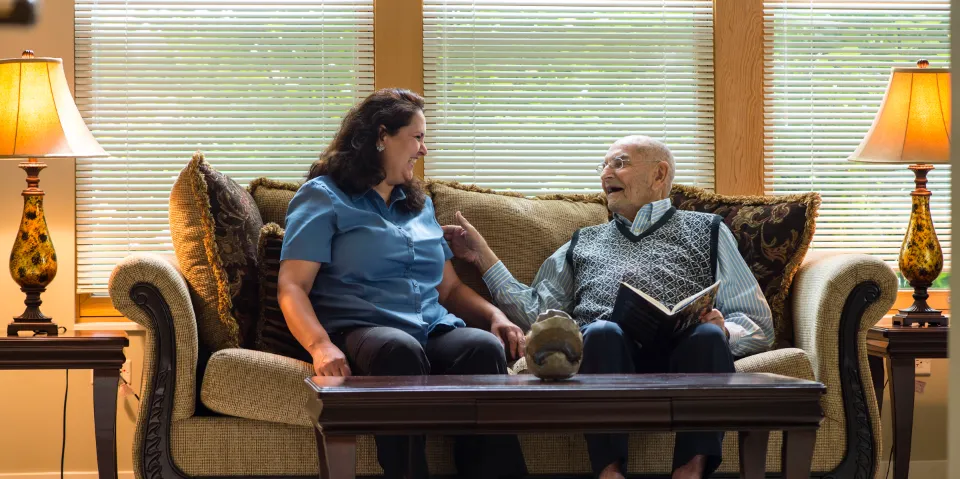The majority of people eagerly anticipate retirement. Many people have a clear image in their mind of taking vacations, exploring the nation, rediscovering hobbies, and reawakening passions that had been dormant during the years spent raising children and working.
It can be challenging to make the transition to an independent living community, and when looking for the best independent living community for you, it’s easy to become confused by the range of amenities and costs. All of your questions will be addressed in this article.
Continue reading to discover more about what it’s like to live in an independent living community, how much it costs, and how you can make it work (both financially and otherwise!) for you.
What is An Independent Living Community?
Independent living communities (also known as active adult, 55+, 62+, senior living, or retirement communities) give healthy seniors the freedom to maintain a social and recreational lifestyle with the added convenience of services like housekeeping, prepared meals, and transportation. The average senior age in these communities is 74 to 75, and there are many different living arrangements available, including private homes, apartments, and suites. Residents appreciate the peace of mind that comes with knowing that security is in place around-the-clock and that help is always available

.
The main distinction between independent living and other types of senior living is that the focus is not on providing regular medical care or help with activities of daily living like bathing and dressing, although some facilities do have onsite assisted living and medical staff to step in as needed. For independent seniors who want to live in a community but do not currently require daily access to nursing staff or personal care assistance, this is a great option because of the emphasis on maintaining independence.
Who is Suitable for Independent Living?
It can be confusing to decide which type of senior community is best for you or a loved one because there are so many different senior living options. By highlighting some of the traits that residents of independent living share, we have helped you make a more informed choice. Some of the people who should consider independent living include:
- Seniors who do not need assistance with activities of daily living (ADLs), like bathing, dressing and medication management
- Seniors who do not need medical assistance on a regular basis
- Seniors who want assistance with cooking and home maintenance, but are not ready to give up their independent lifestyle
- Seniors who live alone or feel isolated and would like to meet others through social and recreational activities
- Seniors who are retired and ready to live a more laid back, convenient lifestyle
- Seniors who desire the safety net of a 24-hour staff who can quickly provide help if needed
How Much Does Independent Living Cost?
The average monthly cost of senior independent living in the US is between $2,000 and $5,000, but costs can vary greatly depending on location, services, and amenities. Five Star communities can be found all over the country in both urban and rural settings, and they come in a variety of sizes and shapes. While each community has its own amenities, all share the same commitment to and standard of excellence for residents.
Factors that can increase or decrease the monthly fee of an independent living community include:
Type of Community
The price may vary depending on the kind of independent living community. For instance, a more conventional independent living community will only charge a month-to-month rate, whereas a CCRC will frequently charge that significant entrance fee in addition to a monthly fee.
Dining Plans
One benefit of residing in an independent living community is the frequent provision of flexible meal plans to residents. Not all residents, though, desire to eat every meal at the neighborhood restaurant. A dining plan with fewer monthly meals will be less expensive than one with a wider range.
Amenities and Services
Depending on the kind and quantity of amenities provided, communities may charge varying prices. For instance, a community with a fitness center and saltwater pool might have a higher monthly cost than one without these amenities.
Real Estate Value
Costs of living and prices can vary from state to state and region to region, just like any real estate purchase. It might be more expensive to live in a community in a larger, more rural town than in a bustling city that has been named one of the best places to retire.

Size of the Residence
In an independent living community, you have a choice of floor plans, and a larger square footage will probably cost more. Similar to how an attached garage, patio, or other features could raise the cost of a house.
Additional Care
The availability of other care options on campus may also affect costs, which can vary from community to community. Personal wellness courses and physical therapy are two examples of additional care options.
How Can I Pay for Independent Living?
With any budget, there are ways to increase the affordability of independent living. Though most seniors pay for independent living with private funds, the monthly cost of independent living can become much more manageable through senior living financing options like:
- A Bridge Loan or Senior Line-of-Credit: These short-term, “interest-only” loans help fund assisted living costs until the necessary money comes in.
- Deferred Annuity with Long-term Care Rider: The investor contributes a lump sum to a deferred annuity rather than making regular insurance payments. The money can then be withdrawn tax-free and without incurring any penalties from the IRS in order to pay for assisted living.
- Life Settlement Accounts: A senior can receive a lump sum payment by selling their life insurance to a third party through a life settlement agreement.
- Veteran’s Benefits: The Aid and Attendance Benefit is a monthly payment that US veterans and their surviving spouses can use to cover the cost of assisted living.
Things to Consider When Choosing An Independent Living Community
When researching independent living communities, there are many things to take into account. The three main categories to concentrate on are broken down below, along with specific questions you should consider.
Social and Recreational Opportunities
One thing that distinguishes independent living from other senior living communities is the abundance of social and recreational opportunities. Retired seniors in good health want to make the most of their “golden years,” enjoying hobbies and extra time with friends. Because of this, it’s crucial to check that a community provides a wide range of scheduled activities for all interests.
Convenience Services and Amenities
Seniors looking for independent living should think about a community’s services and amenities before relocating in addition to the social calendar. Consider what is most significant to you right now. Maybe you are eager to put the chores of laundry and housecleaning behind you, or maybe you can’t imagine life without your morning tennis game. Spend some time deciding which amenities and services you must have.
When evaluating independent living communities, a significant aspect to take into account is the dining experience. When it comes to mealtime schedules, food preferences, and dining environments, residents frequently want to maintain their independence. When weighing your options, look for neighborhoods that provide flexible dining options to accommodate your changing needs.
Conclusion
If independent living is something you intend to do in the future, you should start considering how it will fit into your retirement plans. Set up a meeting with your financial advisor and start being open about how you can make independent living a top priority.



